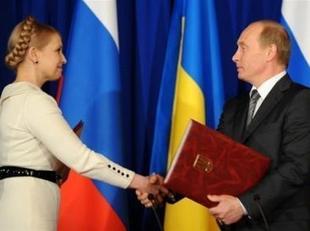 Russian Prime Minister Vladimir Putin will meet Thursday with his Ukrainian counterpart Yulia Tymoshenko for talks on energy amid unease in Europe over possible cuts in gas supplies this winter.
Russian Prime Minister Vladimir Putin will meet Thursday with his Ukrainian counterpart Yulia Tymoshenko for talks on energy amid unease in Europe over possible cuts in gas supplies this winter.
The two premiers are due to meet at the Livadia Palace in Yalta, the venue for the historic Yalta Conference in 1945 between Joseph Stalin, Franklin Roosevelt and Winston Churchill, said a Ukrainian official.
On Friday, Putin and Tymoshenko will then join their counterparts from other post-Soviet states in an effort to ramp up cooperation in energy and create a joint air defence system, a Russian foreign ministry spokesman said.
Energy issues are likely to top the Ukrainian agenda as Tymoshenko will seek better terms for Russian gas to help Ukraine’s struggling economy ahead of the January presidential polls, in which she is a frontrunner, analysts said.
Putin’s spokesman Dmitry Peskov confirmed that there will be discussion on gas supplies at the meeting but denied that Putin and Tymoshenko would talk about the upcoming presidential polls in Ukraine.
“These are domestic issues,” he told AFP.
Analysts however said Putin stepped into the fray in October, when he announced that Ukrainian President Viktor Yushchenko, Moscow’s arch foe, had prevented the transfer of funds to pay for Russian gas.
Putin made the announcement, which raised the spectre of new supply interruptions to Europe, after a telephone conversation with Tymoshenko.
Plunging domestic demand for gas has put Ukraine in a quandary, since its current contract with Gazprom requires it to pay for a fixed amount.
Ukraine had been due to purchase 40 billion cubic meters (bcm) of gas this year and 52 bcm next year but would only buy around 32 or 33 bcm in 2009, Ukraine’s energy firm Naftogaz said in September.
A Naftogaz official told AFP on Tuesday that Ukraine may need just 27 bcm of gas next year.
During talks between Putin and Tymoshenko in September in the Polish city of Gdansk, Russia agreed to allow Ukraine to pay for only as much gas as it needs without enforcing penalties.
That agreement has never been put in writing, however, exposing Ukraine to the threat of multibillion-dollar fines.
Securing a better deal on energy, including the possibility of buying less gas next year, will be a top priority for Tymoshenko, analysts said.
“I believe Russia will agree to that, but will play for time when it comes to putting it in writing,” said Vladimir Saprykin, director of energy programmes at the Kiev-based Razumkov center.
Moscow wants to postpone the signing of any major energy agreements until after the January presidential polls in which Tymoshenko will compete with Yushchenko and the more pro-Russian candidate Viktor Yanukovych, Saprykin said.
“Everyone understands that such issues exist and need to be solved,” said a Kiev-based source familiar with the talks, referring to Ukraine’s inability to pay for the volume of gas in the contract.
Saprykin also noted that Ukraine this year has been buying gas with a 20 percent discount on the standard price, and will seek to retain these terms next year.
Highlighting Ukraine’s problems, the European Bank for Reconstruction and Development on Tuesday delayed a decision on issuing Kiev a 300-million-dollar (202-million-euro) loan and criticised Kiev for failing to reform its energy sector.
On Friday, Putin and Tymoshenko will meet their counterparts from other post-Soviet nations for a summit of the Commonwealth of Independent States (CIS), a grouping of ex-Soviet countries.
Andrei Nesterenko, a Russian foreign ministry official, speaking at a regular briefing Tuesday, said the meeting would discuss energy cooperation and fighting the effects of the economic crisis.
“Among other things, it’s planned to earmark the funds to create and develop a joint system of air defence of the CIS state members next year,” Nesterenko added.
Both meetings will take place at the Livadia palace, the imposing former summer residence of the Russian tsars, which stands just outside Yalta in a park overlooking the Black Sea.
 Eurasia Press & News
Eurasia Press & News
